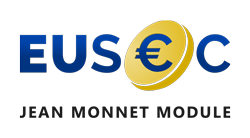"European financial security in the global, regional and national dimension" (EUSEC) financed under the Erasmus + Programme, Jean Monnet Modul, implemented between 2020-2023.
Most of the risk factors for the economic development of countries are related to fiscal imbalances, inflation, persistent financial imbalances, recurring financial crises, large income disparities, financial and economic dependence, increased capital flows, tax avoidance, shadow economy, public debt, demographics, pension system, material and energy security, bank failures, etc.
Depending on the scale of their occurrence, they may affect the economic and financial situation of the country in different ways. The aim of the project is to disseminate, transfer knowledge and increase the economic and financial consciousness of students and other recipients in the scope of financial stability, fiscal policy and macro-prudential policy in the EU member states. The project is carried out in the interdisciplinary way and is fully consistent with the concept of the current role and position of the EU in creating conditions for sustainable economic development of all member states.
Project objectives:
- Promoting research, education and seminars in the area of public and international finance
- Introducing new moduls and to expand the teaching of public and international finance
- Providing students with extended knowledge to be used in their further study or professional work, as well as raising students` consciousness of the important role played by the EU in shaping the economic development and macroeconomic situation of the member states
- Promoting dialogue between the academic world and experts in the management and coordination of public finance
The detailed goals:
- Expanding the didactic offer of the Warsaw School of Economics with two new courses and individual diploma seminars related to the subject of the project
- Supporting dialogue and cooperation between the academic community and experts, and engaging students and young researchers in both research activities and the policy-making process
- Improving student engagement by combing lectures and individual diploma seminars.
The most important activities:
- Introducing two new courses on the subject of the project during six didactic semesters, oriented on practical knowledge
- Conducting 10 individual diploma seminars and 3 open international seminars dedicated to the subject of the project
- Publishing (as an author or co-author) at least three academic articles in renowned journals, as a direct product of research, international seminars or expert meetings.



